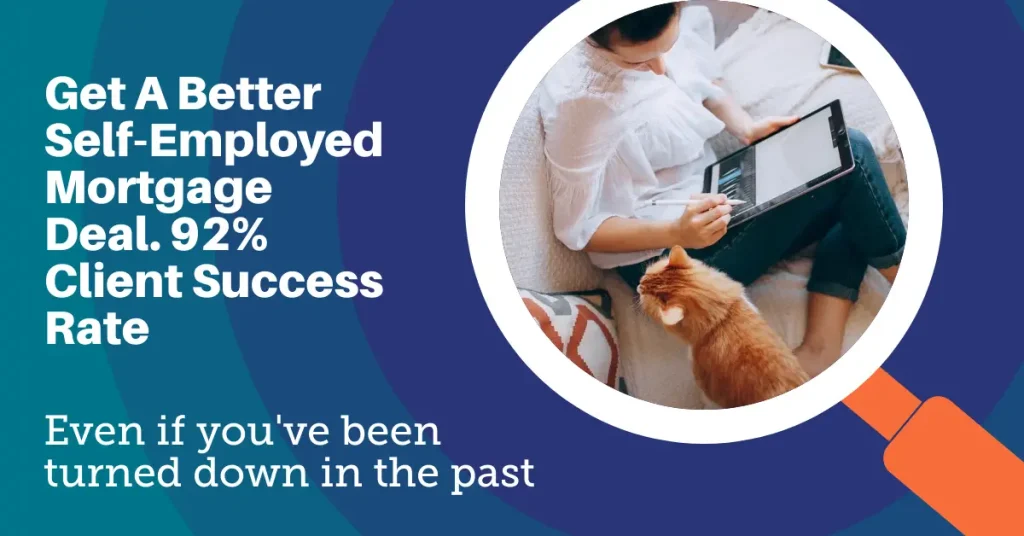Mortgages For Self Employed UK Deals For 2025
We Can Get You the Self-Employed Mortgage to Fit Your Unique Needs

If you’ve been looking for the following, we’d love to help you:
- Mortgages For Self Employed With 1 years Accounts Or Without Accounts
- Mortgage Products For The Self Employed In Scotland
- Halifax Self Employed Mortgage Deals
- Nationwide Self-Employed Mortgage Offers
- HSBC Self Employed Mortgage Deals
- Who Are The Best Self-Employed Mortgage Lenders?
- Rates From 4.29% Fixed for 3 years
- Rates From 4.44% Fixed For 5 years
Self-Employed Mortgage Pre-Decision In Principle Application Form:

Best Mortgage Deals For Self-Employed Workers Like You
Have you considered acquiring a self-employed mortgage? Are you confused by the process or overwhelmed by the details? Our knowledgeable advisors are available to help!
- UK Specialists. 30 Second Form
- Compare Over 25,000 + Products, including a 1 year accounts mortgage
- Get Your Quotes From Our Expert Providers
- We Look Beyond Automated Credit Scoring, Giving The Self-Employed A Chance
- First Time Buyer Mortgage, Buy-To-Let, Contractor Mortgages, Cashback, Offset, & Large Loans
We can help you to sort through different mortgage options from a number of different lenders and help to find the best lender and mortgage plan that matches your unique situation.
How do we ease your stress and get you what you need? We have been in your shoes and know what it takes to make the process seamless and simple!
We understand the challenges and frustrations that self-employed people face every day and can be your partner in applying for the mortgage you need.
Best Mortgages For Self Employed
The best mortgages for self employed are still likely to be the big banks like Lloyds, HSBC and Barclays, for any property including cheap flats for sale in Scunthorpe uk and London riverside flats.
We Can Get You The Self-Employed Mortgage To Fit Your Unique Needs
Our client base ranges from people who are involved in partnerships or self-employed, contractors with limited liability companies, and those who work for umbrella companies. We can arrange mortgages for applicants who operate within payment structures, including sole traders, limited company directors, contractors, and freelancers.
After an informal 15-minute conversation with our mortgage advisors, our organisation can arrange a mortgage plan for you with competitive rates from the beginning that are just as good, if not better, than those made available to traditional, permanent employees. Imagine how good it will feel to collect the keys to a new home, knowing you have a great mortgage and a mortgage broker to back up such a big purchase.

Self-Employed Mortgage Pre-Decision In Principle Application Form:

Do self-employed people in the UK have to pay higher mortgage rates?
There is a common belief that mortgage rates for self-employed people are higher than those offered to employees. However, mortgage lenders say this isn’t true and assess mortgage applications based on individual circumstances and risk factors rather than employment status.
What’s the truth about mortgage rates for the self-employed?
Although mortgage rates can vary depending on your circumstances, mortgage lenders say self-employed mortgage rates aren’t higher than those offered to employees.
You may have heard that mortgage rates for self-employed people are around 1% or more than mortgage rates for employees. This is because mortgage lenders tend to use the person’s gross earnings divided by 52 as a crucial part of their affordability calculations.
So, if you’re self-employed and have irregular earnings, then mortgage lenders will likely assume an income lower than what you earn. This means mortgage rates could appear higher than mortgage rates for employees believed to make a set amount each year when mortgage affordability is calculated.
We checked mortgage rates offered by the major mortgage lenders. We used the same mortgage amount and deposit; the mortgage term was 25 years. Although interest rates can vary depending on your circumstances, our research suggests mortgage rates for self-employed people aren’t higher than those offered to employees.
We looked at mortgage rates for borrowers with a 25% deposit who borrowed £150,000 over 25 years. The mortgage rate for a self-employed borrower was 2.39% from Sainsbury’s Bank, while the rate for an employed borrower was 2.59% from Santander.
We also looked at mortgage rates for borrowers with a 25% deposit who borrowed £200,000 over 25 years. The mortgage rate for a self-employed borrower was 2.69% from Sainsbury’s Bank, while the rate for an employed borrower was 2.74% from HSBC.
Our research suggests mortgage lenders don’t automatically offer higher mortgage rates to self-employed people and base their decisions on individual circumstances and risk factors rather than employment status. However, rates can vary depending on your circumstances.
A mortgage product for self-employed people is called an ’employer mortgage’. This mortgage allows you to use self-employed income when applying for a mortgage and can be used in addition to the 0% stamp duty mortgage offers we’ve seen recently.
To qualify, lenders expect you to have been self-employed for at least one year and require proof of self-employment, such as your tax return.
If self-employed, mortgage lenders base affordability calculations on the applicant’s income rather than their rental or mortgage repayments. They will calculate mortgage rates based on what you earn, not how much it costs you to live.
If mortgage rates for self-employed borrowers are around 1% or more than mortgage rates offered to employees, then why do mortgage lenders advertise mortgage rates at the same level?
Mortgage lenders tend to advertise mortgage rates based on their Standard Variable Rate (SVR), which is often higher than what they offer customers on their mortgage deals.
For example, Barclays offers mortgage customers 2% interest on their mortgage products, but the mortgage lender’s SVR is 3.99%. If you were to apply for one of these mortgages (based on our research), you’d likely get the lower mortgage rate instead of the SVR. However, many lenders show mortgage rates based on their SVR when quoting mortgage customers.
Mortgage lenders say self-employed mortgage rates aren’t higher than those offered to employees, and rates for self-employed people will vary depending on their circumstances.
Is it gross or net income that a mortgage lender looks at?
When considering you for a mortgage, a mortgage lender looks at your gross income. This is the total amount of money you earn before any taxes or deductions are taken out. The lender looks at your gross income to ensure you can afford to make your monthly mortgage payments, even after accounting for taxes and other deductions.
Should you use a broker to get a self-employed mortgage?
The self-employed often have a more challenging time when it comes to getting a self-employed mortgage. A self-employed person earns their income through the profits of their own company, whether they are self-employed as an individual or run a limited company. The self-employed sector represents around 15% of the UK workforce, including most freelancers in the creative industries.
When it comes to self-employed mortgages, lenders will pay attention to your self-employed income for around five years, so you must be able to prove that you have at least three years of self-employment in your business history. We have lenders often willing to work with clients that only have one year’s worth of accounts. This is one of the perks of choosing a well-connected broker to help you through the self-employed mortgage maze.
How to Get Started When Applying for Your Self-Employed Mortgage
Getting the application process started is very simple—fill out our initial inquiry form and submit it! After your form is received, one of our knowledgeable advisors will review your inquiry and call you to discuss different mortgage options. We pride ourselves on being a “Whole of Market” mortgage broker, which means you have complete choice flexibility and gives our clients a huge advantage.
The lenders we work with understand that we know the details of self-employed mortgages just as well as they do. They are pleased to receive our enquiries and offer great deals and rates for our clients. We package our applications with only the most important information that lenders need to make a deal, making it simple and easy to work with us both as lenders and as mortgage applicants.
Another advantage of working with our organisation for your self-employed mortgage needs is that we work with underwriters and lenders who understand the unique challenges that self-employed individuals face. Our clients come from various backgrounds, including accountants, management consultants, doctors, GPs, financial service professionals, marketing professionals, architects, engineers, etc.
Knowing this, our lenders appreciate that our clients’ financial accounts may not fully tell the story of their earnings or disposable income, which are indicators for determining affordability. Because our lenders understand these circumstances, it is much easier for our mortgage advisors to work with them and find the best possible deal on self-employed mortgages!
Other Useful Guides:
- 2018 Remortgage Industry Report
- Options For Pensioners 65-85
- Zero Hour Contract Finance
- Government Mortgage Schemes
- Leasehold Property Good Or Bad?
- Near Prime Or Sub-Prime Borrowing
- No Credit History Property Purchasing
- How To Get An Application Approved
- How To Repair Your Credit
- Credit Refinancing Post Divorce
- Remortgage Without The Risk
- Funding Lending Scheme Mortgages
Other Departments
Navigating the UK mortgage market is challenging, especially for self-employed people. Over the years, the self-employed mortgage sector has evolved, becoming more inclusive but still presenting hurdles for many. Understanding the self-employed mortgage rates, various mortgage offerings, and the best options available in 2025 is essential for those looking to secure their dream home or investment property.
The Landscape of Self-Employed Mortgages
The perception of risk associated with self-employed mortgage applicants has historically been higher than for those on a steady payroll. This notion arises because self-employed income can fluctuate and is thus perceived as unstable. However, the rising number of self-employed individuals in the UK has led to a more profound understanding and adjustments in lending criteria by many lenders.
Factors Influencing Self-Employed Mortgage Rates
The self-employed mortgage rates largely depend on several factors:
- Income Stability: Mortgage lenders primarily look at the consistency of your income. Most lenders prefer to see at least two years’ worth of accounts, except for the Halifax 1-year self-employed mortgage.
- Loan-to-Value Ratio (LTV): The amount you intend to borrow against the property’s value can impact your mortgage rates.
- Credit Score: As with any mortgage, a higher credit score often results in better interest rates.
- Deposit Amount: Larger deposits can often open doors to better mortgage rates.
Choosing the Best Self-Employed Mortgage Lender
There is an array of best mortgage lenders for self-employed individuals, each offering unique packages and rates. Halifax self-employed mortgage, Nationwide self-employed mortgage, and HSBC self-employed mortgage are just a few renowned names that have carved out niches in the market. Additionally, brokers like self-employed mortgage specialists can provide tailored advice and help navigate the best options available.
In recent years, lenders have also introduced products catering to specific segments within the self-employed demographic, such as mortgages for freelancers or contractors. These niche products can sometimes offer better terms than generic self-employed mortgages, so it’s worth investigating if you fit into these categories.
Challenges and Solutions for Self Employed Mortgages
One significant challenge for many self-employed individuals is proving their income. Do mortgage lenders use gross or net income for self-employed in the UK? Typically, lenders will look at the net profit for sole traders and the salary and dividends for limited company directors. This method can pose problems if you minimise your profit to reduce tax liability, as it may affect how much you can borrow.
Another common concern is the duration for which one has been self-employed. Newly self-employed individuals might wonder if they qualify for a mortgage. While many lenders prefer to see at least two years’ worth of accounts, there are mortgages for those self-employed with 1 year’s accounts. Similarly, there are options for those who have been self-employed for longer, such as the self-employed mortgage 2 years accounts.
Exploring the best self-employed mortgage 2 years accounts
For those who’ve navigated the initial challenges, the next step is to find the best mortgage deals. The choice can be overwhelming with options like Best Mortgage Deals 2025, Best Mortgages 2025, or Best Mortgage Provider 2025. However, the key is to compare the offers based on interest rates, fees, flexibility, and other terms that are essential to you.
Leveraging tools like mortgage brokers for self-employed or independent contractor mortgage specialists can help. They are often aware of the nuances of the market and can provide advice tailored to your circumstances.
The Broader Picture: RAAC and property Considerations before a self-employed remortgage
In addition to the financial aspects of acquiring a mortgage, understanding the type of property and its construction methodology is crucial. For instance, properties constructed with reinforced autoclaved aerated concrete (raac) have specific considerations and implications in the property world. While this might not directly affect your mortgage, it’s a facet of the property-buying process that shouldn’t be overlooked.
The Future Outlook: Self-Employed Mortgages UK 2025
The landscape for self-employed mortgages in the UK is continually evolving. The mortgage market will likely see further shifts as remote work and freelancing become more prevalent. For self-employed individuals looking to buy in 2025, staying updated on changes in lender criteria, evolving self-employed mortgage products, and potential government incentives can be beneficial.
With the UK housing market ever-evolving and the rise in self-employed individuals, mortgage lenders have adapted their criteria and offerings to cater to this segment. Whether you’re a freelancer, contractor, or running your own business, securing your dream property is very much within reach. When applying, remember to seek advice, research thoroughly, and present the best financial picture possible. With the right approach, the dream of homeownership can become a reality for the self-employed in the UK.
